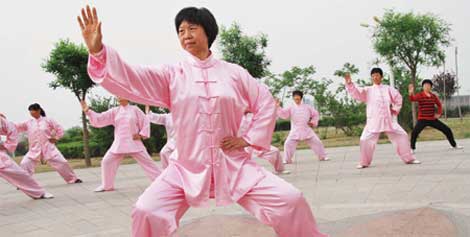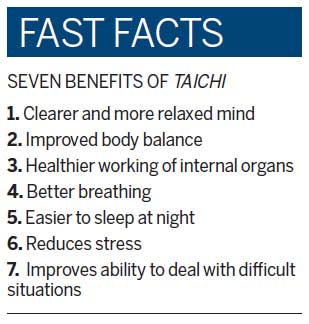Going with the flow
Updated: 2011-08-12 11:29
By Liu Xiaozhuo (China Daily European Weekly)
 |
|
Taichi practioners in Henan province go through the motions of the ancient exercise. According to taichi teachers, the practice relieves stress and boosts well-being. Xu Hongxing/ for China Daily |
White-collar workers find a traditional exercise helps them with the frustrations of city life
Cheng Xiaoxue is a busy Beijing accountant and as her professional success and salary rose, so did her anxiety and stress. "I had so many worries and was upset everyday about my work, my relationships with my co-workers and other troublesome things. I was so stirred up that I could not fall asleep at night," Cheng says.
About 18 months ago the 38-year-old woman discovered the traditional Chinese exercise of taichi and her life changed dramatically for the better. Cheng says taichi helps slow her racing mind and as a result of continued practice she has been given a measure of inner peace that has improved all areas of her life.
"Now I am a calm and peaceful person. Taichi has broadened by mind and I learnt to be more tolerant with others and myself. I do not have that rushing, urgent feeling of anxiety any more," Cheng says.
According to taichi teachers, the martial art is gaining new popularity among young city workers, who are using it to relieve stress.
Taichi is accredited to legendary monk Zhang Sanfeng, who many believe was born in 1247 and lived during the time Marco Polo visited China.
He studied Buddhism and martial arts at the Shaolin Temple before leaving and setting up the Daoist temples at Wudang Mountain.
|
|
At Wudang Mountain he created the martial art of taijiquan, which means shadow boxing.
According to legend, he witnessed a magpie and snake fighting in the grass. He considered the softness and fierceness of both creatures, and incorporated these ideas into a 72-movement exercise.
Zhang Wangnan, director of the promotion and training department of Chinese Wushu Association, says the 72-movement routine was very complicated and difficult for the average people to learn.
So, in 1956 the Chinese government simplified taichi into 24 moves. In 1995, 16-move and 8-move routines were also adopted and the exercise became even more popular.
One man who knows the martial art better than most is Yang Songquan, a 60-year-old taichi master.
Yang teaches in his courtyard home in Beijing and has practiced taichi for almost 50 years.
Yang, from Henan province, has taught in Beijing for almost 20 years. "I learned taichi from my grand-father. In fact, I am a 10th generation Chen-style taichi practioner, and I have taught almost 6,000 students over 20 years," he says.
Yang says taichi helps promote energy within the body and as a result promotes a feeling of well-being.
He says according to Traditional Chinese Medicine, taichi movements together with steady breathing, helps energy, or qi, flow through the body.
"In the human body there are 12 main meridians and eight secondary meridians through which qi flows and reaches the major organs. If qi is interrupted, is weak or blocked, illness will follow," Yang says.
Every morning across China, taichi can be seen practiced in public parks, mostly by older people. It is one of the iconic scenes of China.
But Yang is seeing younger people, aged in their 20s or 30s, taking up the art. This young generation is caught in the hussle and bustle of modern Chinese life.
"They come to learn taichi because they realize their lifestyle is unhealthy. Taichi improves their physical and mental health," he says.
Chinese are not the only people joining this trend.
Lloyd David Ward, an American businessman, has learnt taichi with Yang for six years and says taichi has helped not only his personal life but his business life, too.
"Taichi teaches me the better way of business. I have learned the importance of balance and harmony from taichi," he says.
More and more people across the world are realizing the benefit of the ancient exercise, says Ronnie Robinson, secretary of Taijiquan and Qigong Federation of Europe.
"People need to get a better sense of themselves, their bodies and their relationship with others. This is one of the reasons that more people are learning taichi," Robinson says.
Robinson says there are more opportunities for Europeans to learn taichi because cultural communication between China and European countries is getting closer.
The Chinese Wushu Association says one of its top goals is to spread taichi culture internationally and works with organizations in other countries to stage the World Wushu Championship.
This year the 11th World Championship will be held in Turkey and the taichi contest is one of the most popular events. China will send two of its best to compete.
"This event will be a good opportunity to showcase Chinese taichi culture to the world," Zhang says.
The Chinese Wushu Association has also invited movie star Jet Li, one of the world's most influential Chinese kungfu movie stars, to become its image ambassador and help promote taichi.
"Most foreigners have become familiar with taichi moves thanks to Jet Li," Zhang says. "He can attract more foreign friends to learn taichi."
Although the government has made an effort to promote taichi domestically, the martial art still suffers from difficulties and problems: Lack of good teachers.
Zhang Wangnan says there are numerous taichi training centers across China, many of them opened by individuals who are not authentic teachers.
"The teaching quality is poor," says Zhang, and this is one problem that may hinder the development of authentic taichi culture.
Zhang Yongtao, the head of Beijing Yang-style Taichi Research Society, says learning taichi properly is vital and cannot be simply done in a park.
"At present, the main space people can go practice and communicate is in parks. However, parks are not enough to hold other taichi events other than classes," Zhang Yongtao says. "These other events are important so we can fully develop the culture."
Zhang's society had to recently cancel a promotional activity at the Beijing Olympic Stadium, because another, "more important" event was given priority.
Another problem is the lack of money. Zhang's society has about 300 members and each member pays 25 yuan every year in fees.
"The money that we get from members is far from enough for inviting masters or holding other activities," Zhang says.
E-paper

My Chinese Valentine
Local businesses are cashing in on a traditional love story involving a cow herder and a goddess
Going with the flow
Outdoor success
Lifting the veil
Specials

Star journalist leaves legacy
Li Xing, China Daily's assistant editor-in-chief and veteran columnist, died of a cerebral hemorrhage on Aug 7 in Washington DC, US.

Sowing the seeds of doubt
The presence in China of multinationals such as Monsanto and Pioneer is sparking controversy

Lifting the veil
Beijing's Palace Museum, also known as the Forbidden City, is steeped in history, dreams and tears, which are perfectly reflected in design.

